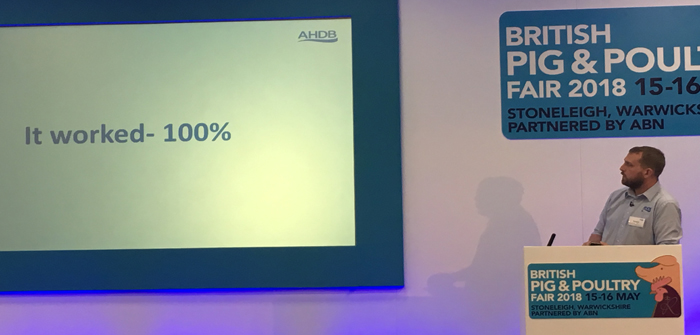An AHDB forum highlighted the infinite possibilities stemming from its work on End2End Traceability. Jane Jordan reports
End2End traceability via individual electronic identification (EID) and DNA tracking could bring numerous benefits to pig production and the supply chain, a forum detailing the latest trials on the technology heard.
The hi-tech approach to traceability presents infinite possibilities to trace, monitor and analyse individual pigs’ value within a business throughout their entire lives, Dominic Charman, technical manager at AHDB Pork, said.
He explained how research into maternal DNA tagging and EID and data capture for slaughter progeny was unlocking the door to gold standard traceability. Its findings could change how quality assurance is delivered and managed across the whole pork chain in future and create infinite opportunities for UK pig businesses to improve production efficiency, product quality and consumer confidence.
AHDB’s End2End traceability trial has been investigating how pork chains can use data to improve productivity and customer assurance.
The research, supported by Cranswick, Wayland Farms, Hellenic Systems, Woodhead Brothers/Morrisons and Frontmatec, has been looking at whether DNA samples taken from individually tagged pigs at the slaughterhouse can be traced back to their birth mothers.
They have also been testing the practicalities and benefits of using UHF technology and data capture to find out if the information collected can be integrated into existing management systems, on farm and at the abattoir. A key objective is to establish if UHF technology can deliver individual traceability from when a pig is born to the carcase chiller. If so, can the data collected at slaughter (grading, meat percentage, fat content, lung/liver scores etc) be attributed to specific pigs and their family lines/genetics to highlight trends and characteristics producers might manipulate to increase production efficiency and improve pig quality?
As part of the trial, researchers collected meat samples from the carcases of two pigs produced by DNA-tagged sows. They also gathered samples from non-trial animals. All samples, unlabelled, were mixed together for DNA screening.
At the lab, scientists were able to eliminate every non-trial sample and also accurately identify the meat samples that had been taken from the carcases of progeny born of DNA-tagged sows. The DNA analyses also identified which carcase originated from each individual sow.
“We believe this to be the first time maternal DNA from a finished pig has been tracked from a carcase on the slaughter line back to the sow that produced it,” said Mr Charman.
A software programme that can present and analyse EID tag-recorded data has been developed. It will enable producers to filter and isolate performance data for individual pigs and link it to heritage and medical history. With predictive analytics, in time it could also estimate carcase weights to within 6kg by using birthweight and maternal sow parity statistics.
The cost of using EID and DNA tracking technology on farm is estimated at 70p per finished pig, which includes tagging and weighing at birth. However, AHDB said this investment was easily offset by potential production benefits. For example, getting 5% more pigs to finish within contract specifications was probably worth £1 a pig, and reducing pleurisy by 50% could achieve similar cost savings.
A number of EID/DNA-based tracking systems are being tested commercially and the results are exciting, said Mr Charman. Wayland Farms and Cranswick, in Norfolk, are now analysing UHF tag data within their integrated pork chain and have confirmed that it does provide complete traceability from farm to abattoir – valuable data the company could potentially use to improve production efficiency across its business.




